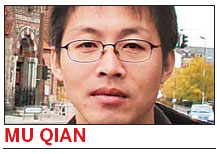

Before the Beijing premiere of Five Acts of Life, a dramatization of five short stories by the Chinese writer Lao She (1899-1966), it was heralded for its strong Beijing flavor and the warm reception its "Beijingness" received in Hong Kong in March.
A Beijing newspaper commented that the success of the play in Hong Kong "breaks the rumor that Beijing-style culture can't cross the Yangtze River".

The Beijing flavor of the show is certainly bona fide, as the scriptwriter, director, and actors are all native Beijingers, or people who have lived a large part of their lives in Beijing. Many of the actors are from the Beijing Quju Troupe, believed by many to be the most authentic traditional Beijing opera group.
Director Lin Zhaohua, of the Beijing People's Art Theater, has been widely praised for using actors from the Beijing Quju Troupe instead of his own company, which has been criticized for losing its original "Beijingness".
However, I don't think the success of the play should be attributed to traditional Beijing culture, which after all is only a superficial part of the work.
Like many of Lao She's later works, the five stories adapted for Five Acts of Life, are devoted to revealing the darker side of the society of his time.
Lao She's greatness lies not in his use of Beijing slang, but in his deep understanding and vivid depiction of human nature.
"I have never for one instance thought that old Beijing culture is a problem for understanding. I think in all great art, be it from Beijing or Moscow or Africa, there is always something connected to life that we all share," says So Kwok-wan, program director of the Hong Kong Arts Festival which presented Five Acts of Life to the Hong Kong audiences.
With the help of Chinese and English subtitles, the Beijing dialect proved not to be a barrier for the Cantonese speakers.
Although "Beijing flavor" has proved a good brand for marketing of the show, I believe most people who see the show, whether in Hong Kong or Beijing, came to see Lao She's portrayal of people's destinies rather than the Beijing dialect.
Nowadays we often hear nostalgic and even indignant voices lamenting the decline of traditional Beijing culture, which is not really surprising as the city metamorphoses from a dynastic capital into a 21st-century international metropolis.
The environment that nurtured traditional culture has changed. To preserve the old culture would require returning to an earlier way of life, for example, to forsake the subway and use rickshaws.
Maybe we should not only shed a tear for the traditional way of life that has been lost, but also rejoice in the new Beijing culture that is emerging.
Today one can enjoy not only Peking Opera, but also symphonic music; not only traditional Beijing snacks, but also cuisines from all over the world.
Today's Beijing is not yesterday's Beijing, and tomorrow's Beijing will not be today's Beijing. The same is true of its culture.
While some critics are celebrating "Five Acts of Life as a sign that Beijing flavor is not outdated", I'd rather see the success of the play not as a success for the celebration of Beijing culture, but as a success for art.